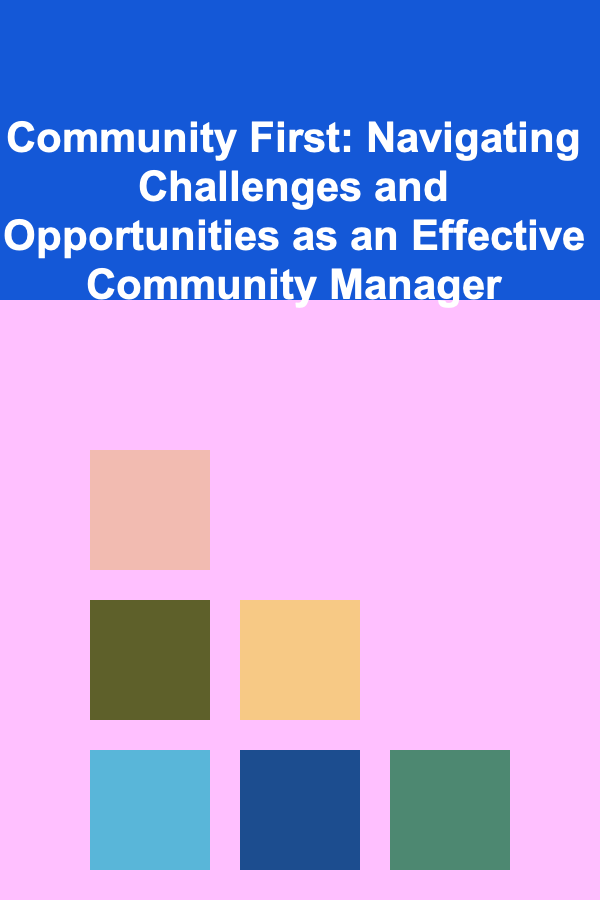
How to Develop Your Creative Writing Abilities
ebook include PDF & Audio bundle (Micro Guide)
$12.99$7.99
Limited Time Offer! Order within the next:

Creative writing is a powerful form of self-expression that allows writers to craft unique stories, poems, essays, and more. It offers an outlet for imagination, emotion, and reflection, making it one of the most fulfilling forms of writing. However, the journey of becoming a skilled creative writer is not easy. It takes time, dedication, and the willingness to explore and experiment with different techniques and styles.
In this article, we'll explore how you can develop your creative writing abilities. From understanding the fundamentals of writing to honing your voice and style, we'll dive deep into the various steps and strategies that can help you enhance your writing and find your unique creative voice.
Understanding the Basics of Creative Writing
Before diving into more advanced techniques, it's essential to have a solid understanding of the basic principles of creative writing. These include narrative structure, character development, dialogue, setting, and more.
1.1 Narrative Structure
Every story needs a solid structure. The most common structure used in creative writing is the three-act structure, which consists of an introduction (the setup), a middle (the confrontation), and a conclusion (the resolution). Understanding how to structure a story helps you ensure that it has a clear beginning, middle, and end, creating a satisfying experience for your readers.
- Act 1: The setup introduces the main characters, setting, and the central conflict. This is where you establish the world your characters live in and introduce the primary problem that drives the plot.
- Act 2: The confrontation is where the main character faces challenges and obstacles in trying to resolve the conflict. This is often the longest part of the story and involves rising action, emotional conflict, and character development.
- Act 3: The resolution provides a conclusion to the story, resolving the conflict and tying up loose ends. This is where the character's journey comes to an end, and the story is brought to closure.
While this structure is popular, it is not the only way to tell a story. As you grow as a writer, you may find other methods that suit your style better, but understanding the traditional three-act structure is a good starting point.
1.2 Character Development
Characters are the heart of any story. Whether you're writing a short story, a novel, or a poem, the way you create and develop your characters will make or break your work. Strong characters should feel real, relatable, and dynamic.
When developing your characters, consider the following:
- Backstory: Every character has a past, even if it's not directly revealed in your story. Understanding where your characters come from, their experiences, and their motivations will help you make their actions and choices more believable.
- Motivation: What does your character want, and why do they want it? The motivation drives the plot and creates conflict. It's essential to have a clear understanding of your character's goals, fears, and desires.
- Growth: A good character will change over the course of the story. This can be in small ways, such as a shift in perspective or larger, more dramatic transformations. Ensure that your character grows, learns, or evolves through the events of the plot.
1.3 Dialogue
Dialogue is an essential tool in creative writing because it allows you to reveal character traits, develop relationships, and move the plot forward. Effective dialogue should sound natural, be purposeful, and be true to the characters.
When writing dialogue, keep these tips in mind:
- Be authentic: Each character should have their own distinct voice. Consider their background, personality, and emotions when crafting their speech.
- Show, don't tell: Instead of explicitly stating things, use dialogue to show the character's feelings, thoughts, or opinions. A conversation can reveal a lot without the need for direct exposition.
- Pacing: Dialogue can affect the pacing of a story. Quick exchanges can create tension, while longer conversations can slow down the pace and provide more depth.
1.4 Setting
The setting of a story is more than just the backdrop for the action; it can play an integral role in shaping the atmosphere, mood, and tone of your work. A well-crafted setting can enhance the reader's experience and immerse them in the world you've created.
- Descriptive Details: Use vivid descriptions to bring the setting to life. Focus on the sensory details---what your characters see, hear, smell, feel, and taste.
- Mood and Atmosphere: The setting can reflect the emotional tone of the story. A dark, rainy night might suggest mystery or tension, while a sunny afternoon might evoke feelings of peace or nostalgia.
- Symbolism: Sometimes, the setting can carry symbolic meaning. For example, a decaying building could represent a character's mental state, or a vibrant city could symbolize freedom and possibility.
Read Widely and Often
One of the best ways to improve your creative writing abilities is to read as much as you can. Reading widely exposes you to different writing styles, genres, and techniques that can inspire and influence your work. It also helps you understand what works in writing and what doesn't.
2.1 Explore Different Genres
While it's essential to have a niche or preferred genre as a writer, reading across genres can enhance your creativity and understanding of storytelling. For example, reading poetry can teach you how to use language concisely and evocatively, while reading fantasy novels can help you develop world-building skills. The more you expose yourself to different forms of writing, the more versatile and imaginative your own writing will become.
2.2 Learn from the Masters
As you read, pay attention to authors who inspire you. Study their writing closely and analyze what makes their work successful. Look at their sentence structure, pacing, character development, and how they create tension and emotion. Don't just read for enjoyment---read critically and with a writer's eye.
Practice Writing Regularly
The key to improving your creative writing abilities is consistent practice. Like any skill, writing improves the more you do it. The more you write, the better you'll understand your strengths and weaknesses, and the more you'll develop your unique voice.
3.1 Set Writing Goals
Setting clear, achievable writing goals can help you stay motivated and focused. Whether it's writing a certain number of words each day, completing a short story by the end of the month, or finishing a novel within a year, having a goal gives you direction and purpose.
- Daily Word Count: Aiming for a daily word count, even if it's just 500 words, can help you build a writing habit. This consistent practice will sharpen your writing skills over time.
- Short-term and Long-term Goals: Break your writing projects into smaller, manageable steps. This will make large tasks less overwhelming and keep you on track to reach your ultimate goal.
3.2 Experiment with Writing Prompts
Writing prompts are a great way to spark your creativity and overcome writer's block. They can help you think outside the box and explore new ideas. You can find writing prompts online or create your own by asking questions like:
- "What would happen if a character woke up with no memory of who they are?"
- "Write a scene from the perspective of an inanimate object."
The more you experiment with different prompts, the more you'll find your voice and refine your writing style.
3.3 Join a Writing Group or Workshop
Writing groups and workshops provide a supportive community of writers who can offer feedback, encouragement, and constructive criticism. Sharing your work with others can help you see your writing from a different perspective and identify areas for improvement.
- Feedback: Receiving feedback from others is invaluable in helping you grow as a writer. It helps you identify strengths and weaknesses you may not have noticed on your own.
- Accountability: Being part of a writing group or workshop keeps you accountable. The regular deadlines and discussions encourage you to keep writing and improving.
Develop Your Unique Voice
One of the most important aspects of creative writing is developing your own voice. Your voice is what makes your writing distinctive and personal. It's the way you express your ideas, emotions, and stories in a way that no one else can replicate.
4.1 Be Authentic
The key to finding your voice is to write authentically. Write from your heart, not just to fit a specific genre or trend. When you write with honesty and vulnerability, your readers will connect with you on a deeper level. Authenticity resonates with audiences, making your writing stand out.
4.2 Experiment with Style and Tone
Don't be afraid to experiment with different writing styles, tones, and perspectives. Try writing in first person, third person, or even second person. Play with different tones, from humorous to serious, or even surreal. The more you experiment, the more you'll find a style that feels natural to you.
4.3 Trust the Process
Finding your voice takes time and patience. Don't expect to write a perfect piece on your first try. Allow yourself to make mistakes and learn from them. Your voice will evolve as you grow as a writer, and the process itself is just as important as the end result.
Edit and Revise
No matter how skilled you become as a writer, editing and revising your work is essential. The first draft is just the beginning. Editing is where the magic happens, and it's what transforms a rough piece of writing into a polished, professional work.
5.1 Take a Break
After finishing a draft, take a break from your work before you begin editing. Stepping away from the piece allows you to return to it with fresh eyes and a clearer perspective.
5.2 Read Aloud
Reading your work aloud is an excellent way to catch awkward phrasing, repetitive words, and pacing issues. It also helps you gauge how your writing sounds and flows. If something feels off when reading aloud, it's a sign that it needs to be revised.
5.3 Focus on Clarity and Precision
When editing, focus on making your writing clear and concise. Eliminate unnecessary words, redundant phrases, and weak language. Strong writing is about precision---choosing the right words that convey your message effectively.
Conclusion
Developing your creative writing abilities is a continuous journey of learning, practice, and self-reflection. It takes dedication and an openness to experimentation, but with consistent effort, you can hone your skills and discover your unique voice as a writer.
By understanding the fundamentals, reading widely, practicing regularly, and seeking feedback, you'll be well on your way to becoming a more confident and skilled creative writer. So, grab your pen, sit down at your desk, and start writing. Your creative potential is limitless, and the world is waiting for your stories.

Community First: Navigating Challenges and Opportunities as an Effective Community Manager
Read More
How to Choose the Right Safe for Your Home and Valuables
Read More
How to Maintain Your Home's Water Heater for Maximum Efficiency
Read More
How to Stage a Luxury Home for High-End Buyers
Read More
How To Understand Robot Perception and Sensing
Read More
How to Ace Your First Semester as a Professor
Read MoreOther Products

Community First: Navigating Challenges and Opportunities as an Effective Community Manager
Read More
How to Choose the Right Safe for Your Home and Valuables
Read More
How to Maintain Your Home's Water Heater for Maximum Efficiency
Read More
How to Stage a Luxury Home for High-End Buyers
Read More
How To Understand Robot Perception and Sensing
Read More